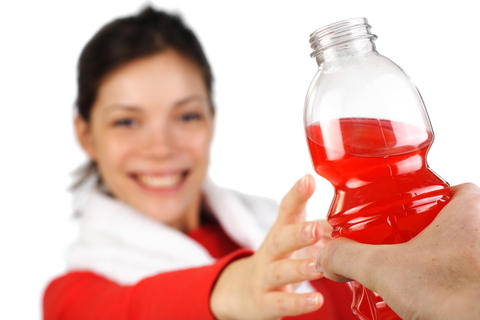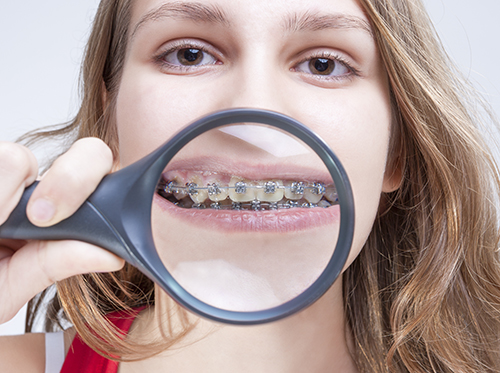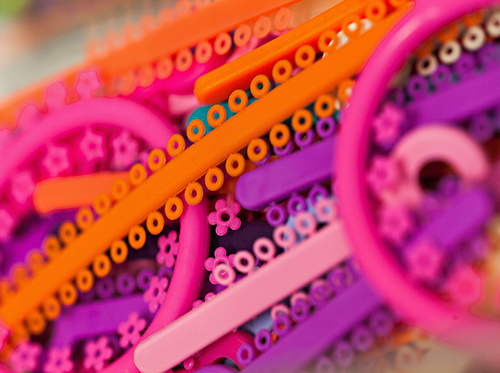September 19th, 2017

Sports and energy drinks cause irreversible damage to the teeth of teens and young adults. A recent study published in General Dentistry states that energy and sports drinks contain so much acid that they begin destroying teeth after only five days of consistent use. According to the Academy of General Dentistry, an estimated 30 percent to 50 percent of U.S. teenagers consume energy drinks and as many as 62 percent consume at least one sports drink per day. The high acidity levels in the drinks erode tooth enamel and the result is irreversible damage.
Dr. Sung Lee and our team at Sung Lee Orthodontics encourage our patients to limit their intake of sports drinks. The enamel erosion ultimately makes teeth more susceptible to bacteria and that can lead to hypersensitivity, staining, and tooth decay. If you do consume an energy or sports drink, make sure to wait at least 45 minutes until you brush, as consumption of acidic drinks causes tooth enamel to soften, making teeth more vulnerable to wear from the abrasives found in toothpaste.
Tooth decay is the most common chronic childhood disease, five times more common than asthma. It’s also preventable with proper care. Dr. Sung Lee and our team can help identify early signs of erosion and offer solutions on how to prevent further damage and more serious problems from occurring.
September 12th, 2017

Our green office offers many benefits to patients. And just because we’ve gone green doesn't mean that we won't be able to provide the same services as a traditional office. In fact, our goal is to provide the same (or better) services as a regular office, but services that act in harmony with the body and world around us. Less waste, fewer chemicals and heavy metals, and reduced energy consumption; these are traits that define a truly green office.
Some of the benefits you'll experience as a patient at our green Puyallup, WA office include:
- Better air quality – There's a focus on using renewable and natural building materials, paint that is free of volatile organic compounds (VOCs), biodegradable cleaning supplies, and formaldehyde free materials for cabinetry. This leads to cleaner air in the office for patients and their families.
- Less radiation – Digital X-rays replace old film based X-rays and expose patients to 90 percent less radiation. Digital X-rays are also convenient for patients since their images can be viewed right on the computer screen instead of on a physical printout.
- No need for paper – Many offices have gone "paperless." You'll get any pertinent paperwork via email, reducing paper waste and saving you time. Patient records are also stored digitally, doing away with the wall of patient folders and making for easier and quicker record retrieval.
- Fewer chemicals – Green offices take advantage of chemical-free sterilization by steam and clean their tools using energy-efficient washers and dryers. Biodegradable cleaning solutions instead of toxic chemical cleaners are used around the office, too.
- Reduced heavy metal exposure – Biocompatible, non-allergenic, non-metal materials like porcelain and ceramic are preferred in a green office over the heavy metals (nickel, titanium) used in traditional offices. This is particularly important in the case of appliances that are used over long periods of time, like dental implants or veneers.
Dr. Sung Lee and our team hope you realize the positive effect a green office can have on your health, as well as that of the environment. Our office is dedicated to bringing you the cleanest, safest, and greenest technologies the industry has to offer, and we're happy to share how our processes differ from other offices!
September 5th, 2017

School can present a few issues when it comes to caring for your braces and mouth, since you won't have the luxury of the time and tools you have at your disposal while you're at home. But if you head to school prepared, you shouldn't have any trouble keeping your braces and mouth in great shape. Below is a list of helpful tips to care for your braces throughout the entire school year.
- Bring a kit that includes all of your oral health care items. This is a seriously smart thing to do and probably the most important of all the tips. Pack things like a toothbrush, floss, wax, retainer case (if needed), a mirror, a small cup for rinsing, a small bottle of water (if you don't already have some water with you), and some OTC pain medicine or a natural pain remedy. Keep the kit in your locker or backpack. Having all these items on hand will save you a lot of trouble and discomfort, and also ensure you don't have anything unsightly stuck in your braces or teeth!
- Take advantage of breaks and lunchtime. After eating lunch is a great time to pop into the restroom and give your braces and teeth a once over to make sure you don't have any food debris caught in them and to tend to any sore spots. If you've just had your braces adjusted, you may have soreness on your gums or cheeks. This is where the wax you packed will come in handy.
- Eat the right food for your braces. Avoid all the foods that wreak havoc on your braces like gum, candy, popcorn, hard chips, apples which aren't cut into wedges, nuts, beef jerky, ice, etc. You know the foods we're talking about; you've heard it enough already. Steering clear of these foods will help you prevent any possible mishaps with your braces, like breaking a bracket or wire, which is the last thing you want happening at school.
If you follow these tips and also keep up on your oral health routine at home, you'll be maximizing the effectiveness of your braces and making them as comfortable as possible. Do you have questions about caring for your braces during the school day? Ask Dr. Sung Lee or anyone in our Puyallup, WA office and we'll gladly help you out!
August 29th, 2017

There's something special about customizing the elastics on your braces to fit your unique personality. Once you embrace your braces (no pun intended) you'll realize how many color options and combinations there are to choose from. Although you'll have a fantastic smile afterward, you won't have this level of customizability once your braces come off, that's for sure!
Adding flair to your braces isn't what all patients are looking to do (like those opting for clear aligners or ceramic braces), but it's part of the fun of traditional metal braces! Many of our patients ask Dr. Sung Lee to have their elastics match the colors of their favorite sports teams or their school, but how about changing your elastics to match holiday colors?
Here are some options to consider:
- Valentine’s Day – Red and pink
- Easter – Pink, blue, and violet
- Halloween – Orange and black
- Christmas – Red, green, and white
- Saint Patrick’s Day – Green and white
There are a few colors that some people choose to avoid. But if you’re trying to make your teeth stand out in a crowd, the following suggestions need not apply!
- Brown or Green – can be mistaken for food being stuck in your teeth
- Black – might look like a rotten tooth if someone isn't looking hard enough
- White – Some patients think it will make their teeth look whiter, but in fact it can make your teeth appear yellower than they actually are. White elastics can also stain easily.
- Yellow – accentuates the yellowness of your enamel
Since changing the color of your elastics has no effect on the actual orthodontic treatment process, the idea is to have fun and add a personal touch. So, next time you get your elastics changed at our Puyallup, WA office, why not wear your braces boldly and opt for something festive?



